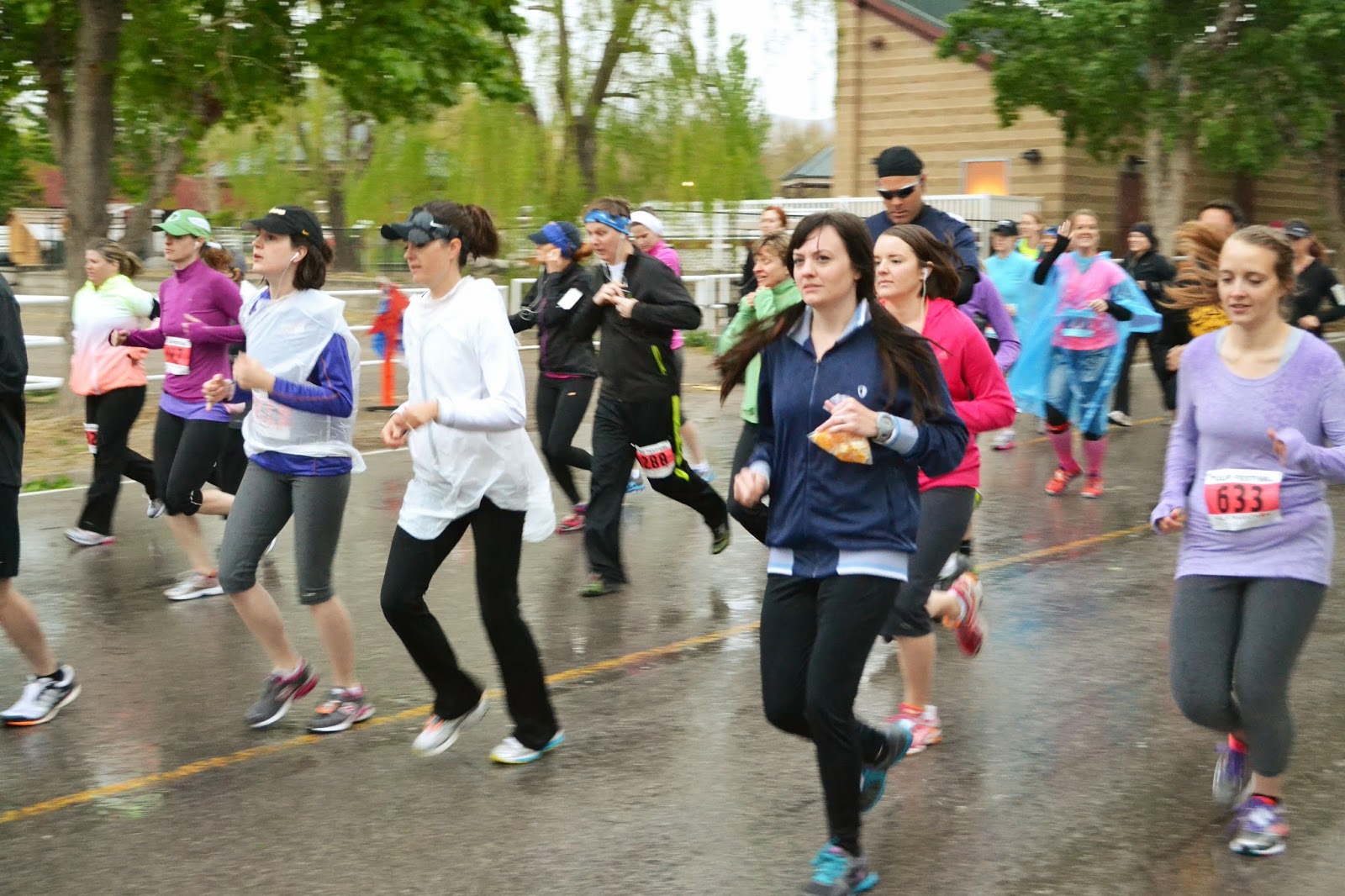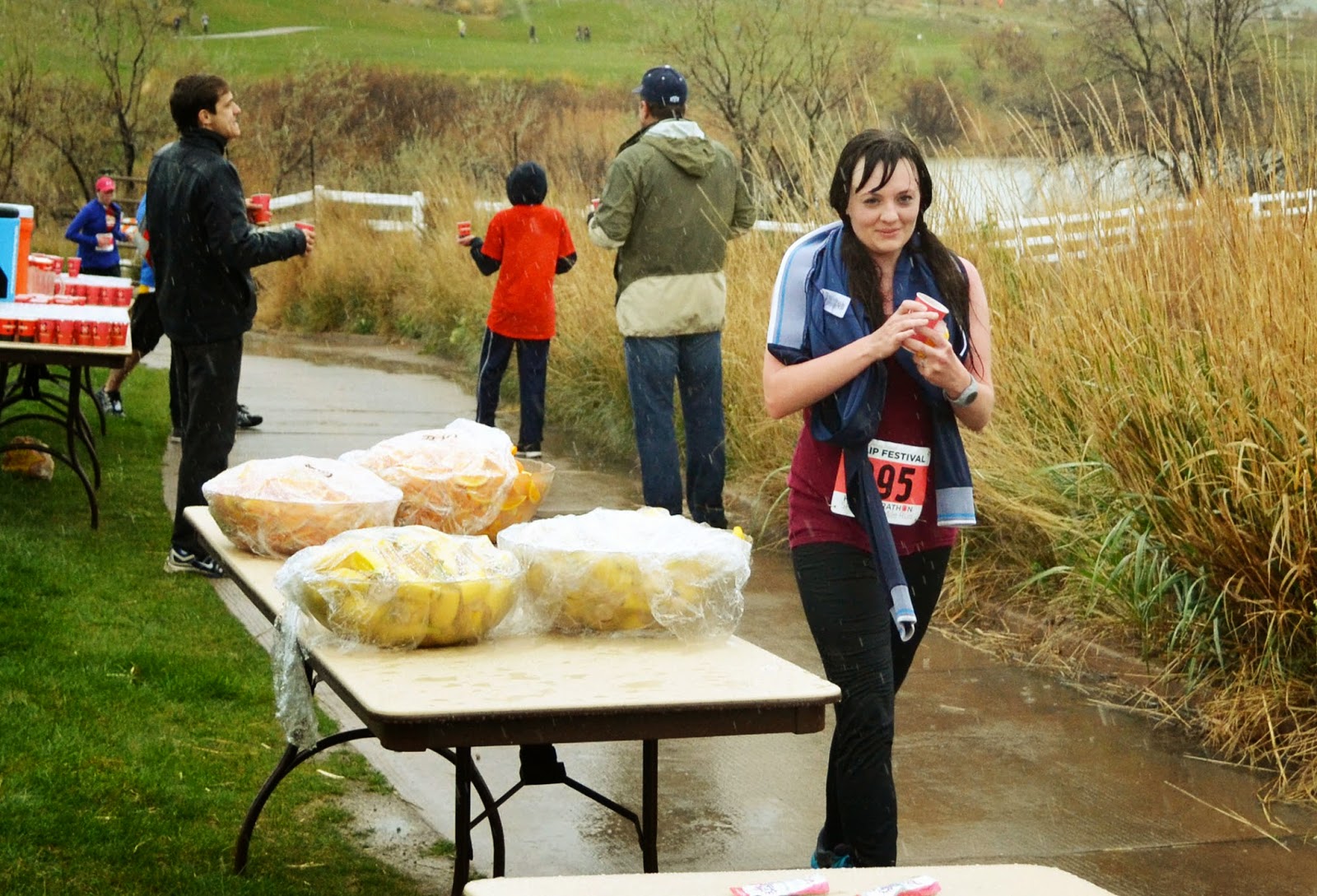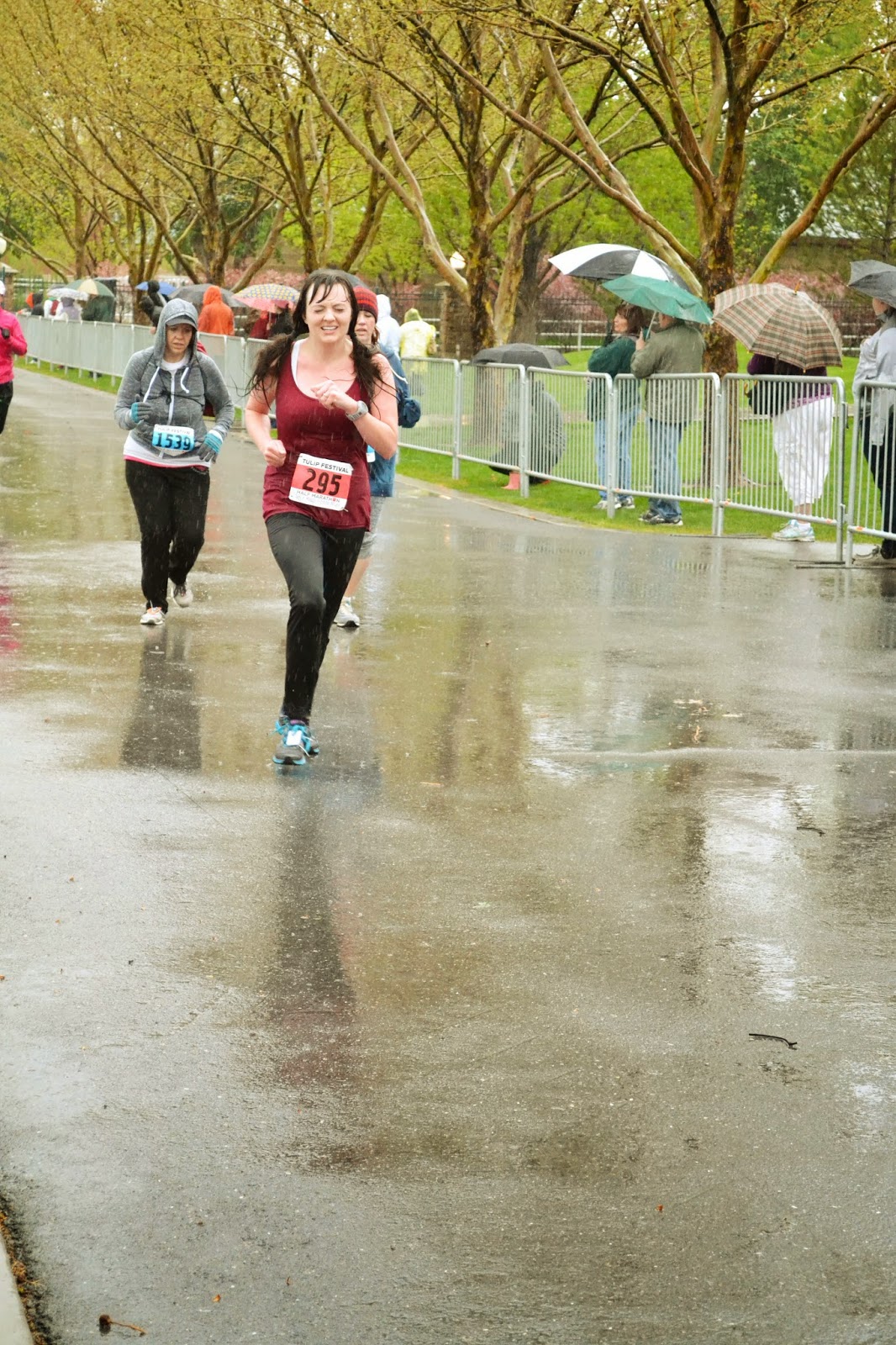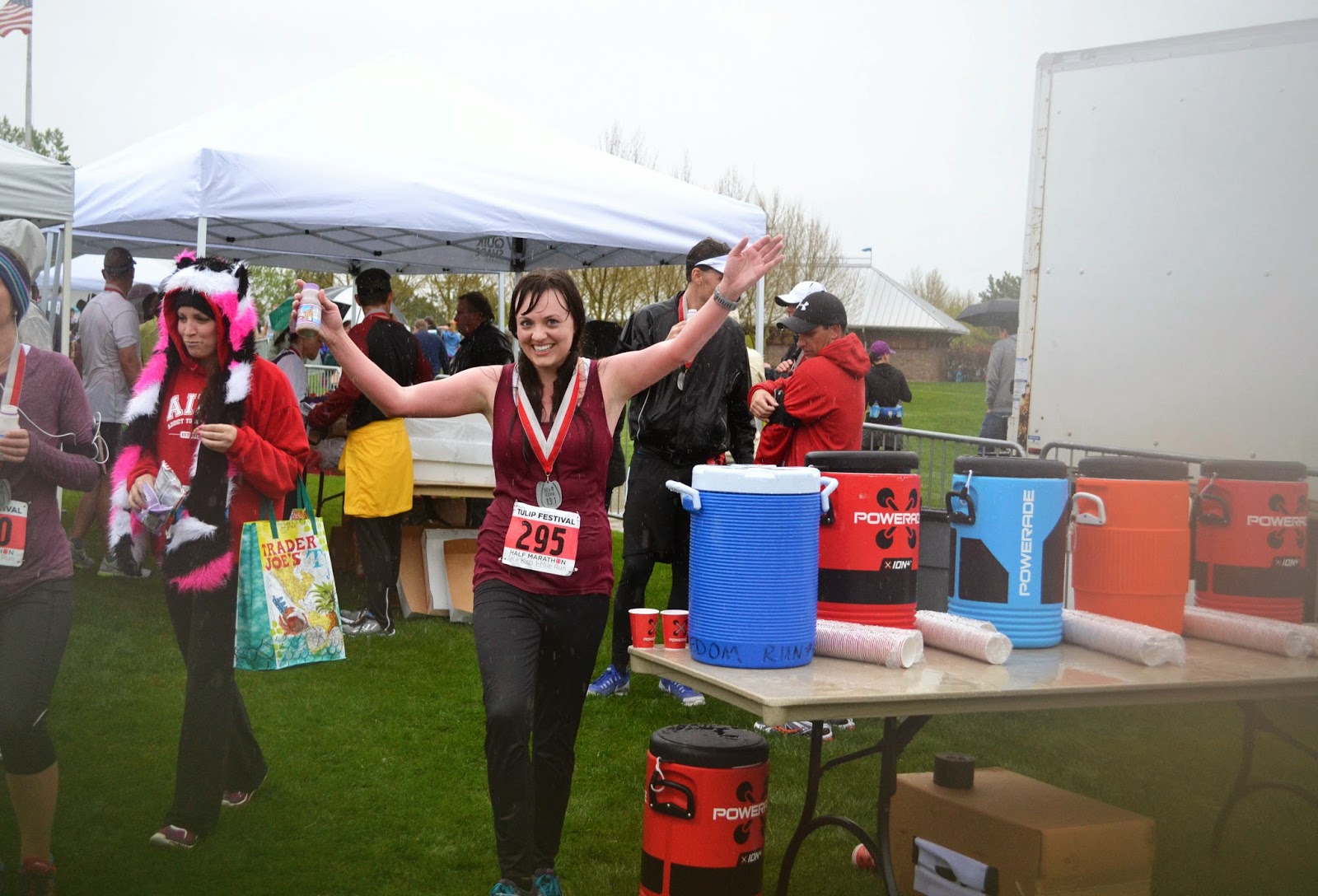Last Saturday dawned drizzly and without much visible sunlight, and I was feeling pretty nervous that the half marathon might be cancelled, especially because the closer we drove to Thanksgiving Point, the harder it seemed to rain. Normally I don’t mind running in the rain, but this was no refreshing sprinkle—this was a cold, get-thoroughly-drenched, try-not-to-slip-in-the-mud kind of rain, and I hadn’t exactly prepared for that.
It didn’t help that the night before, I’d gotten fewer than four hours of sleep due to my brain refusing to shut down (partly because I was paranoid we’d sleep through our 5:30 A.M. alarm and partly because I knew I’d probably just seen my grandma for the last time alive that night (Friday)). So at 6:15, Matt and I, groggy and a little disoriented, left my sister’s house (where we’d stayed the night since she lived closer) and drove down to Lehi.
When we ran the Salt Lake Marathon two years ago, Matt and I had arrived almost an hour early, leaving us plenty of time to go to the bathroom, strap on our magnetic race trackers, and adjust our bib numbers. When Matt and I got to Thanksgiving Point Saturday morning, I had about 9 minutes before the gun went off, and I REALLY had to use the bathroom, had no idea how to strap the race tracker on, and there were no safety pins in sight to help me get my bib on. Miraculously though, with Matt scrambling around asking for pins and me getting into the shortest bathroom line, I was able to make it to the starting line with about 45 seconds to spare before race time.
In other words, to sum up my rather long intro, it wasn’t exactly the most ideal start to the race.
The good news was that my body was itching to run—I had been under so much stress all week, and all the tapering hadn’t helped ease that anxiety since it meant I didn’t have as much head-clearing running time. (For any non-runners, “tapering” is when you drastically reduce your mileage the week leading up to the race so that your body will be fully recovered and rested for your big day.)
Throughout all my many weeks and months of training, I had come up with a pretty set strategy (that I’d tried and tested out on long runs and that seemed to work well):
I would start out at a pretty slow pace for the first mile (about 45 seconds slower than what I wanted my next few miles to be), I would maintain a faster pace for miles 2-9 (which is when I seem to be most “in the zone”), I’d probably slow down by necessity for miles 10-12 (but I still wanted to try and stay under 10 mins/mile if possible), and then I’d use mind tricks the last 1.1 miles to push myself back to the type of pace I’d had in miles 2-9. If everything went as planned, I would be right on track to finish in 2:07 or just a bit faster.
So in plainer terms, here was the plan:
Mile 1 = about a 9:55 mile
Miles 2 – 9 = between a 9:00 and 9:30 mile
Miles 10 – 12 = anything under 10:00/mile would be ideal, but I was expecting I’d have to increase to about 10:20 – 10:30
Mile 13 = between a 9:00 and 9:30 mile
Mile 13.1 (last tenth of a mile) = an all-out sprint (at about a 7:30 pace, if I could manage it)
I know to any non-runners out there, this kind of planning probably seems over-intense, but when you run a race this long, you really should have a plan in place to keep you on track and make sure that you mentally stay in the race. I’m always amazed how some people just randomly decide, “Hey, I’m going to run a half-marathon,” they train a little bit (maybe with their longest run being about 6 or 7 miles long), and then they just decide they’re going to “wing it” come race day.
Maybe some people handle that kind of run-by-the-seat-of-their-pants kind of thinking well, but I know I sure don’t. I knew I’d have the best possible chance of having a good race if I trained hard and planned carefully. (I even had my breakfast carefully planned out—4 eggs, scrambled, and about 2/3 of an avocado. It’s a breakfast I’ve tried out multiple times before long runs with a high degree of success, due to minimal GI distress after and a prolonged sense of satiety.)
I did an excellent job sticking to my plan until about mile 8 when we started hitting some crazy-steep hills. Miles 5 to about 11 were all on a golf course, and while many of the hills were manageable, there were a few inclines that were so steep I was practically walking up them (because my pace was so slow). Luckily, I’d prepared myself at least somewhat for hills, so I usually forced myself to increase the pace on the uphills and then I just sprinted full speed down the downhills. That strategy worked super well until about mile 8 (like I said) when I just didn’t have the lung capacity to be hitting the uphills so hard anymore. Miles 8-9 were both at about a 10:30 pace, which meant that if I wanted to meet my goal time, I’d have to make it up elsewhere, which wasn’t likely to happen.
And sure enough, I ended up finishing in 2:08:17, a mere 18 seconds off of my ultimate goal time. Those two miles had basically cost me my goal.
Even though I didn’t quite make the time I wanted, I’m still proud of my performance–I ran a great race, and it was the first race I’ve ever done where every minute was really focused on running and on my performance. Usually when I run longer distances, I find that my mind wanders, which means that I don’t always push myself to go fast. But during the half, every minute was focused on how I could keep up the pace, how I could make up lost time, how I could pass just one more person. I feel sure if I run another half marathon anytime soon, I could beat my goal time (a lack of rain would help, too).
It seems that whenever I finish a race, one of the first questions I get asked is, “Are you going to do another one?”
In short—yes.
I don’t know when the next half marathon I run will be, but I do know that there will be a next. Had you asked me ten minutes after I’d finished this last half, dripping with rainwater and shivering so hard I couldn’t open the chocolate milk I’d grabbed, I would have probably said some pretty snarky things to you. But now, three days after the fact and only a little sore, I’m already gearing up for my “next.”
And who knows? Since I don’t seem to be too built for speed, the half-marathon might even become my signature race.
Have you ever run a half-marathon? I’d love to know other people’s strategies for running long races.






